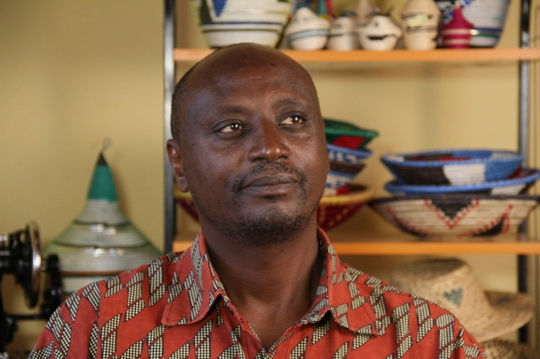DÉO | Rwanda


Prison was the last place Pastor Déo Gashagaza wanted to visit. Behind its walls roamed those responsible for the 1994 Genocide against the Tutsi in Rwanda, individuals who killed 45 of his Tutsi family members and who still wanted to kill him.
“I heard God’s voice say, ‘Go into prison,’” Pastor Déo said. “I told God, ‘I can’t go into the prisons unless you give me a love for the genocide prisoners.’”
One year after the massacre of nearly 1 million Tutsis and moderate Hutus in 100 days, Pastor Déo was the first to enter the prisons and minister to his offenders.
Inside, he was greeted with skepticism and hostility. “A minister looked me in the eye and asked me if I was crazy,” Pastor Déo said. “The prisoners said, ‘Oh! How is a guy like this still alive? Why did he not die? Kill him now!’ One said, ‘Please, let him finish his preaching. Kill him after.’ Inside my heart, I remember the quiet prayer I said: ‘God, you sent me here. Please protect me.’”
Pastor Déo preached from Isaiah 61:1:
“The Spirit of the Sovereign Lord is on me, because the Lord has anointed me to proclaim good news to the poor. He has sent me to bind up the brokenhearted, to proclaim freedom for the captives and release from darkness for the prisoners.”
As he spoke, many prisoners wept and rose to protect him. “We can’t kill him,” they said, initiating reconciliation and something even more surprising: friendship.
By 2001, Rwanda’s 14 jails still overflowed with 125,000 genocide prisoners awaiting trial. Even with a fully functioning legal system, which had largely been wiped out during the genocide, the backlog of cases was estimated to take hundreds of years. The government turned to gacaca, an ancient form of justice where trusted community elders conduct open-air hearings and, with the offenders and the community, decide on a punishment. Unlike the Western justice system, gacaca encourages confession to determine sentencing, which could include additional prison time, community service or reconciliation programs in the communities where they committed crimes.
In 2002, in preparation for the gacaca courts, Pastor Déo led an 80-person team to launch the Umuvumu Tree Project, a modified version of Prison Fellowship International’s Sycamore Tree Project: Justice and Peace®, an in-prison program bringing together crime victims and unrelated offenders to explore restitution and healing. After a successful launch, he trained facilitators to implement the program in all of Rwanda’s prisons.
Between 2002 and 2011, 42,000 prisoners and 10,000 community members participated in the program. At first, only 5,000 prisoners admitted their crimes, despite knowing a confession could lead to a lighter sentence—freedom, even. But as the prisoners digested the program’s concepts of responsibility, forgiveness and reconciliation, they began explaining these ideas to their cellmates.
After less than six months, the number of prisoner confessions rose to 32,000. Not only did the project teach healthy, biblical living and bridge victim-offender relationships, it also aided government investigations, as repentant prisoners began revealing where they abandoned their victims.
The survivors began to take notice. “You are doing so much for the prisoners,” they said, “but nothing for us.”
As Pastor Déo and Prison Fellowship Rwanda expanded their work outside the prisons in response to victim requests, the country’s healing spread rapidly. In less than a year of working with survivors, many were willing to forgive and began asking for the complete pardon of some of their offenders.
Prison Fellowship Rwanda has expanded its restoration efforts by implementing Prison Fellowship International’s child sponsorship program, The Child’s Journey®, and in-prison Bible course, The Prisoner’s Journey®.
Now, decades after the genocide, Rwanda continues to heal. Thanks to God and willing servants like Pastor Déo, Rwandans have true hope.
“Prison Fellowship was, for me, my journey of healing,” said Pastor Déo. “During all this time serving in prison, I was totally healed.”